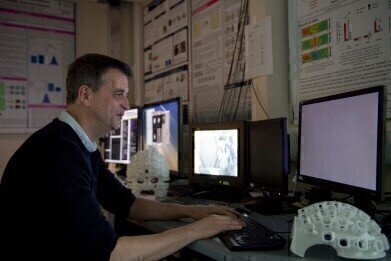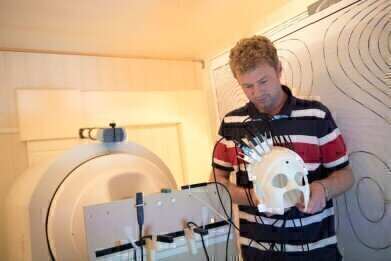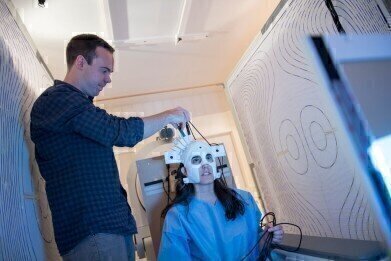-
 Professor Richard Bowtell
Professor Richard Bowtell -
 Dr Matthew Brooke
Dr Matthew Brooke -
 Niall Holmes
Niall Holmes
News
Quantum Sensors Herald new Generation of Wearable Brain Imaging Systems
Aug 19 2017
Researchers at the University of Nottingham and University College London (UCL) are working on a five year project which has the potential to revolutionise the world of human brain imaging. Magnetoencephalography (MEG) is a technique for mapping brain activity — it measures the magnetic fields generated by electrical currents that occur naturally in the brain. A £1.6m Collaborative Award in Science from Wellcome is funding the construction of a new type of MEG scanner which, if successful, could quadruple the sensitivity of current state of the art devices.
Dr Matthew Brookes and Professor Richard Bowtell in the School of Physics and Astronomy are leading the research in Nottingham, where they have already designed and built a 3D printed prototype wearable helmet and are in the very early stages of developing the new MEG system.
Dr Brookes said: “Quantum technology has allowed the development of a new type of optical sensor which has the sensitivity to detect the weak magnetic fields from the brain. Unlike current technology, these new sensors can operate at room temperature, so they can be placed directly on the scalp surface. Our calculations show that by getting the sensors closer to the head we can quadruple the sensitivity of the field detection. This will revolutionise the kind of effect that we are able to detect from the human brain.”
While the physics-based development needed to make the scanner work is being carried out in Nottingham, experts at UCL are carrying out detailed computational and theoretical modelling of the brain to frame the neuroscience and establish what neuroscience questions can be addressed.
A huge and challenging task lies ahead
The research project, ‘Moving functional brain imaging into the real world: A wearable, cryogen-free MEG System’ is led by Professor Gareth Barnes in the Wellcome Trust Centre for Neuroimaging at UCL. He said: “The realisation of this system is a huge, but extremely exciting, challenge, with the potential to revolutionise the brain imaging field. Our simulations and pilot experiments have already shown the unique potential of the new quantum sensors.”
Professor Barnes continued: “Our scanner will be worn on the head like a helmet, meaning subjects can undertake tasks whilst moving freely in an open and natural environment.”
The new scanner has the potential to revolutionise brain imaging for all subjects, but will be particularly useful in children. Professor Richard Bowtell, grant co-applicant and Director of the Sir Peter Mansfield Imaging Centre in Nottingham said: “Because MEG systems are essentially ‘one size fits all’, sensitivity is limited for subjects with smaller heads such as infants since their heads are further from the detectors. Room temperature quantum sensors can be mounted directly on the scalp of any subject. This will give us a projected four-fold increase in sensitivity for adults, but the sensitivity could potentially be up to a 15 or 20 fold increase for children or babies.”
The first stage of their work has already been published.* What the research team really want to do is translate this technology into neuroscience and ultimately a clinical tool for conditions such as drug resistant epilepsy and schizophrenia.
*In NeuroImage
Digital Edition
Lab Asia Dec 2025
December 2025
Chromatography Articles- Cutting-edge sample preparation tools help laboratories to stay ahead of the curveMass Spectrometry & Spectroscopy Articles- Unlocking the complexity of metabolomics: Pushi...
View all digital editions
Events
Jan 21 2026 Tokyo, Japan
Jan 28 2026 Tokyo, Japan
Jan 29 2026 New Delhi, India
Feb 07 2026 Boston, MA, USA
Asia Pharma Expo/Asia Lab Expo
Feb 12 2026 Dhaka, Bangladesh


















